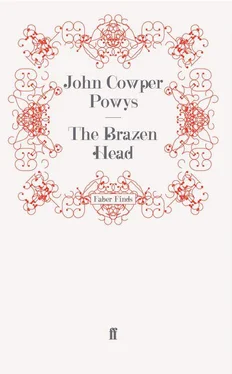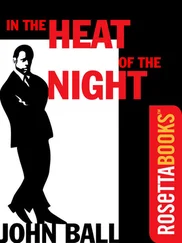Moira had been drowned in the river Wey and her body carried out to sea before she was fourteen, and the ex-bailiff’s son, Randolph, had steadily refused, probably because of some prejudice of his wife against the child’s name, which is Greek for Destiny or Fate, to use it for any of his own daughters, of whom he had several. So nowhere upon earth save in her brother’s heart, and in the exquisite trouble she herself had taken to form those fifteen letters, did there exist any memorial of the little carver of that big word.
It certainly was not of those significant syllables, nor of the question as to who had inscribed them upon that small image, that Albertus Magnus of Cologne was thinking as, by the help of the flame at that tiny shrine, he lit the chief light of the armoury and began making his preparations for the night. Once safe in bed, with an excellent pillow under his throbbing skull, and the armoury-light turned low, and a couple of warm blankets over him, he gazed steadily at the Brazen Head.
“If you can manage for me to spend one night entirely alone with the Head,” he had told Raymond de Laon, “I will most certainly come.”
Well! Here he was, alone with It, and there were four or five hours of total darkness in front of him and no apparent danger of any interruption to whatever communion of body, mind, or even spirit he could bring about between this man-created Being and himself.
Albertus had by nature an outward-working mind, and his natural urge to talk, to teach, to write, to read, to direct, to examine, to explore, to plan, to construct, to build, to organise, to reform, to originate, was so powerful that it was extremely difficult — O much worse than difficult! — extremely repulsive and even loathsome to him to indulge in any sort of introspection.
It was pain and grief to him to analyse his own thoughts, feelings, impressions, and reactions. He might have been bolder in this direction, if he had not known by instinct that there were sleeping devils in the intricate corridors of his mind that it would be dangerous to disturb. He was indeed continuously aware of a particular region in his response to life that held a dark, ultimate, indescribable horror for him.
It was in fact so horrible that it was imperative for him to avoid this region of his mind at all costs. It was a region which, if he couldn’t steer his way round it, and, as far as this was humanly possible, forget it, and behave as if it didn’t exist, would eventually by the pressure of its sheer horror disintegrate his whole intelligence.
It is perfectly possible for an energetic and powerfully galvanic will to win renown for its owner, while the deepest part of the personality which that towering will-power has to carry along with it, just as a swiftly driving chariot might have to carry in the belly of its body a writhing and squirming serpent, may be secretly twitching and quivering with all manner of maniacal distastes and repugnances.
“All my life,” thought Albertus Magnus, “I’ve been escaping from myself. What I’ve been always secretly afraid of is neither God nor the Devil, neither man nor beast: it is simply and solely myself!”
He had grown so accustomed to make certain deeply intimate and yet automatic debouchings and deviations from the direct path in his consciousness of life, so as to dodge, and carefully circumnavigate, and craftily avoid, all those places where his most fearful personal mania and most horrified shrinking would be brought into play, that it was a dangerous shock to him to find that the presence of the Brazen Head disturbed this wise habit.
The only companion, whether male or female, to whom he had ever given a hint of this lake of horror in a secret valley of his soul, was Thomas Aquinas, with whom he had shared lodgings in more than one great seat of learning, and of whom he would retort when the others ridiculed Thomas as a dumb ox, “when this dumb ox starts bellowing, he’ll make the whole world listen.” But we can well believe that it would not have been easy to make a young metaphysician of Thomas’s calibre realize the existence of such a background to his adored teacher’s lively lessons.
But whether Thomas Aquinas realized before he died — for the master outlived the pupil by several years — all that the great Albert’s benevolent energy concealed behind its absorbing and compelling instruction, there can be little doubt that this supreme teacher’s frightful necessity to keep his own nervous malady in the background had something to do with the desperate fervour of his way of teaching.
The more passionately and comprehendingly he could follow and interpret the subtle distinctions in theology, the further he was able to withdraw himself from that appalling lake of horror in the secret depths of his own mind.
What he found himself wondering now — as with rather a troublesome effort he squeezed the thickest of his two pillows under the back of his own head and stared at the Head of Brass — was why the word, that he had by chance noticed inscribed in childish capital letters on that little image of the Blessed Virgin, kept hovering on the intervening air, like faint streaks of splashed blood, between himself and the expressionless countenance of the Brazen Head.
“But surely,” he thought, “in the creation of that Image and in the elaborate workmanship or exquisite machinery that he gave to it,” here he jerked his own head forward almost defiantly—“yes! I’m talking of you, you new Adam, you Adam of wires and wheels and screws and scuttles, and I’m telling you now, here and now, that what your man-maker forgot when he wound you up was the touch of a Virgin!”
What happened then was a volcano-like explosion of feeling, an explosion to which both Magnus and the Brazen Head must have contributed something. The accumulation of force which burst at that moment drew from Albertus, in one whole rush, all the smouldering depths of the spirit with which he had for the best years of his life flooded the gaping arteries of his devoted pupils; while the imprisoned demonic power in the Brazen Head, which seemed only to have been waiting an opportunity to escape, burst forth to meet what the other was giving.
It was not until much later that Albertus was able to offer — to himself we must understand — some kind of an account of what happened. He felt as if the whole dark, enormous, inscrutable mass of blackish-greyish matter, which Aristotle called “Hulee”, and which the philosopher and many of his disciples held was eternal, indestructible, and without beginning, was now around him on every side. He could see it, he could feel it, he could smell it, and it was bearing him up, up, up, on the titanic curves of an agglomeration of merciless substance!
Wildly and desperately Albertus realized that the material substance of his own body had begun to grow larger and larger; and as he was carried upward he became frantically and dizzily aware that in front of him was only empty Space, yes! Space absolutely empty, leading on and on and on, with no limit and without an end!
And then suddenly he spoke to himself in a still small voice. “Albert, old friend,” he said to himself, “there’s no need for you to be alone in Space like this. You have forgotten what all creatures ought never to forget. You have forgotten that there is also Time.”
And at the thought of Time — Time that can reduce Space by measuring the segments of it, Time that can remember backwards to wherever man has been or might have been, Time that can imagine forwards to wherever man will be or could be, Time that’s our friendly and customary home, Time that belonged to our fathers before us and will belong to our children after us, Time that clothes us as with familiar raiment and nourishes us as with bread and wine, Time that gives us a bed to sleep on, Time that gives us a tent to cover us and a fire to warm us — Albertus of Cologne had no sooner uttered these words in a low voice, himself speaking to himself, than lo and behold! he was back again in the armoury of the Fortress, back again with his thickest pillow squeezed under his neck, back again with the flickering blood-stained letters of the word Parthenogenesis hovering in the darkness between himself and the Brazen Head.
Читать дальше











